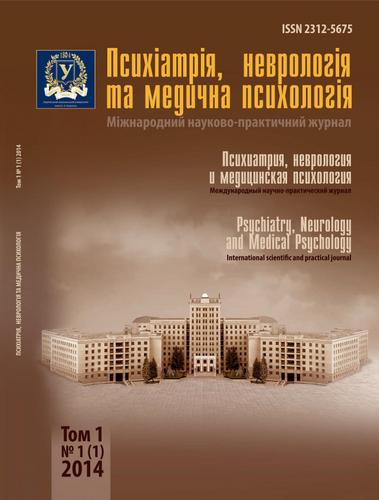Exercise Addiction and Severity of Emotional Distress in Men, Regularly Subjecting Themselves to Intense Physical Stress in the Form of Bodybuilding
Abstract
The work studies the problem of connection between exercise addiction and the manifestation of the emotioal distress in men regularly subjecting themselves to intense physical activities. The data on the empirical study of addictive behaviors associated with physical activity in men engaged in bodybuilding for more than 1 year are given. The data obtained from research of connection between addiction and symptoms of depression and anxiety are also cited. The experimental group data are compared with the data on the control group of persons engaged in bodybuilding, but with no signs of exercise addiction. A conclusion revealing higher rates of emotional distress in the experimental group as compared to the control group is drawn.Downloads
References
Егоров А. Ю. Экстремальный спорт — альтернатива химической аддикции? [Текст] / А. Ю. Егоров // Дискуссионные вопросы наркологии: профилактика, лечение и реабилитация: Мат-лы Российской научно-практической конференции / под общ. ред. проф. А. В. Худякова. – Иваново: Изд-во «Арт Виста». –2005. – С. 112–114.
Arnold R. Patient attitudes concerning the inclusion of spirituality into addiction treatment [Text] / R. Arnold, S. K. Avants, A. Margolin [et all.] // J. Subst. Abuse Treat. – 2002. – Vol. 23. – N 4. – P. 319–326.
Yates A. Eating disorder symptoms in runners, cyclists, and paddlers (rapid communication) [Text] / A. Yates, J. D. Edman, M. Crago [et all.] //Addictive Behaviors. – 2003. – Vol. 28. – No 8. – P. 1473–1480.
Garman J. F. Occurrence of exercise dependence in a college-aged population [Text] / J. F. Garman, D. M. Hauduk [et all.] // J. of Americ. Coll. Health. – 2004. – V. 52. – No 5. – P. 221–228.
Griffi ths M. D. The Exercise Addiction Inventory: A quick and easy screening tool for health practitioners [Text] / M. D. Griffi ths, A. Szabo, A. Terry // British Journal of Sports Medicine, 2005. – Vol. 39. – No 6. – Р. 30.
Ефременко К. Н. Аддиктивный потенциал экстремальных видов спорта [Электронный ресурс] / К. Н. Ефременко/ Режим доступа: http://lib.sportedu.ru/Press/TPPEVS/2010N3/p61-63.htm (дата обращения 20.03.2014).
Короленко Ц. П. Психосоциальная аддиктология [Текст] / Ц. П. Короленко, Н. В. Дмитриева. – Новосибирск: Олсиб, 2001. – 251 с.
Ильин Е. П. Работа и личность. Трудоголизм, перфекционизм, лень [Текст] / Е. П. Ильин. – СПб.: Питер, 2011. – 244 с.
Кривощеков С. Г. Психофизиология спортивных аддикций (аддикция упражнений) [Текст] / С. Г. Кривощеков, О. Н. Лушников // Физиология человека. – 2011. – N 4. – С. 135–140.
Baekeland P. Exercise deprivation [Text] / P. Baekeland // Arch. Gen. Psychiatry. – 1970. – Vol. 22. – P. 365–369.
Veale D. Exercise Dependence [Text] / D. Veale // BritichJornal of Addiction. – 1987. – Vol. 82. – P. 735–740.
Hausenblas H. A. Exercizedependens: a systematic review [Text] / H. A. Hausenblas, D. S. Downs // Psychology of Sport and Exercise, 2002. – Vol. 3. – P. 89–123.
Veale D. Does primary exercise dependence really exist? [Text] / D. Veale // In. Exercise addiction: Motivation for participation in sport and exercise / J. Annett, B. Cripps, H. Steinberg (eds). Britich Psychological Society. Leicester. UK. – 1995. – P. 1–5.
Международная классификация болезней (10-й пересмотр). Классификация психических и по-веденческих расстройств. Клиническое описание и указания по диагностике / под. ред. Ю. Л. Нуллера, С. Ю. Циркина. – К.:, Факт, 1999. – 259 с.
Zung W. K. A self-rating depression scale [Text] / W. K. Zung//Arch. Gen. Psychiat. – 1965. – Vol. 12. – P. 3–70.
Рыбакова В. М. Клинико-психологическая характеристика и диагностика аффективных расстройств при алкоголизме: метод. рекоменд. [Текст] / В. М. Рыбакова, Т. Н. Балашова. – Л., 1988.
Copyright (c) 2014 В. И. Пономарёв

This work is licensed under a Creative Commons Attribution 4.0 International License.

